 Petzlover
PetzloverBoth Asian and Manx are originated from United Kingdom. Both Asian and Manx are having almost same weight. Asian may live 3 years more than Manx. Both Asian and Manx has same litter size. Both Asian and Manx requires Low Maintenance.
Known also as the Malayan, the Asian cat is likened to the Burmese but just with different coat patterns and colors.
This particular cat breed was developed in 1981 in the UK. Apparently there was a mistake mating between a Lilac Burmese and a Chinchilla Persian and kittens from these were born in 1981.
So beautiful were they that a breeding program started with new coat colors and patterns. The breed got the name ‘Asian’ with all the varieties reaching GCCF Championship status.
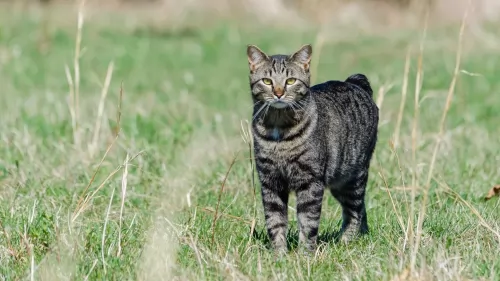 The Manx cat is a domestic cat originating on the Isle of Man, with a short tail. It is one of the oldest cat breeds.
The Manx cat is a domestic cat originating on the Isle of Man, with a short tail. It is one of the oldest cat breeds.
The cat is actually known as being a tailless cat. This is the cat's most distinguishing feature. They've been seen at cat shows since the 1800s.
These cats are descended from mainland stock, whose origins are unknown. It is said these cats are descended from the African wildcat.
The Manx is recognized by the Cat Fanciers Association as well as other cat associations.
The Asian cat is medium-sized and muscular. The male cat is somewhat bigger than the female and weighs roughly 5 – 7kg while the female will weigh roughly 3 – 5kg although most times, there is not much difference in size between the males and females.
The attractive cat has a round head and wide-spaced ears with large green eyes. It’s a slender cat, but athletic with slender legs and medium thickness tail. Asian cats come in a wide range of colors such as fawn, chocolate, black, blue, cinnamon. The coat is short, fine, and silky and the Asian doesn’t require too much grooming.
These are friendly, playful cats and they get on well with children if the children are kind, gentle and respectful with him. This is a fairly dependant cat and he will actually follow his favorite human being, crying out for attention.
The Asian is a social cat and can fit well into different homes. However, because it is a social cat, they require an owner that is willing to spend time with them. They’re cats that are sensitive to the moods of their owners and make excellent companions.
They’re adventurous cats and enjoy exploring and traveling, voicing their opinion on different things as well. The Asian thrives on the attention it gets from their human owners. It’s a sociable cat and is quite talkative too.
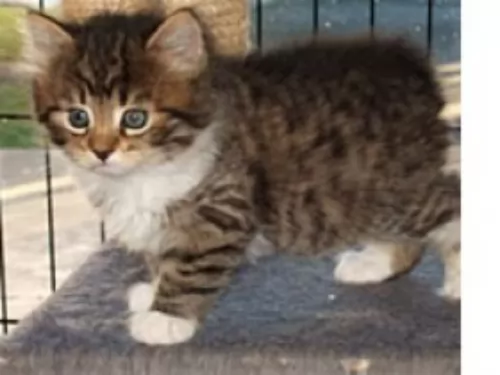 The Manx cat is a medium-sized cat with a stocky, muscular, heavy build. He can weigh between 3 and 6kg. Manx cats come in all coat colors and patterns.
The Manx cat is a medium-sized cat with a stocky, muscular, heavy build. He can weigh between 3 and 6kg. Manx cats come in all coat colors and patterns.
The coat of the cat can be short or long. The long-haired variety is considered its own breed. The cat has always been popular for helping farmers keep rodents under control.
Besides taillessness, the Manx is described as a round cat and its head is round too. The back legs of the cat are much longer than the forelegs.
The eyes of this cat are large and round and can be in different colors such as green, gold, copper, brown, or yellow.
They are very playful and intelligent cats who are devoted to their families. They can easily learn tricks and he can even be taught to walk on a leash.
They’re cats that love to jump and they’re active, playful cats. Don’t be surprised if you see him playing with the water in his water bowl as he is a cat fond of playing in water.
These cats are thought to be dog-like as they’re capable of becoming devoted to their human family. They also have a great sense of humor and they become very entertaining. Children love them as they’re so playful and they in turn get on well with children. When you have a Manx cat in your house, there is never a dull moment.
The Asian cat is such a sweet animal – gentle and affectionate and also very sociable. They are also curious and intelligent and vocal enough to let you know their needs. They're strong-willed if they want something.
The Asian makes an excellent companion for singles, couples, families or the elderly. They also get on well with children and with other pets in the home.
There are quite a few Asian cat varieties and each one promises to make you an excellent companion.
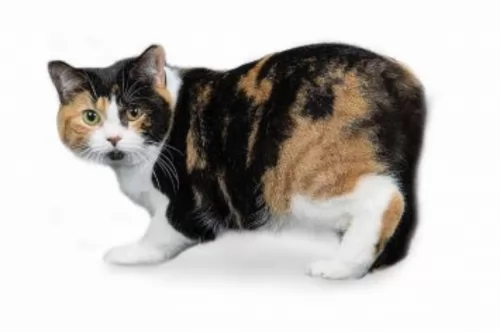 The loving Manx cat is such an even-tempered cat as well and wants to get along well with its entire human family. You can be sure of many years of affection and companionship from this cat.
The loving Manx cat is such an even-tempered cat as well and wants to get along well with its entire human family. You can be sure of many years of affection and companionship from this cat.
It’s a cat that is fairly placid but it still loves to run and play, It’s an amusing cat too and to round everything off it also has a strange way of walking and running.
Give the Manx cat a warm. Loving home and you’ll quickly discover why the Manx cat is such a popular companion cat for so many people. The Manx is such a social, family orientated cat and you shouldn't bring him into your home if you don't have plenty of time for him.
Although there are no specific health issues with this cat, because of it being associated with the Burmese, it may be more susceptible to diabetes mellitus than other breeds.
There are many cats in modern times developing diabetes mellitus – where they are unable to produce enough insulin to balance blood sugar. If the disease goes untreated it can lead to dehydration, vomiting, depression, weight loss, and even death. Your cat will be thirsty and urinating more frequently. There are various treatments and the diet for the cat will need to change too.
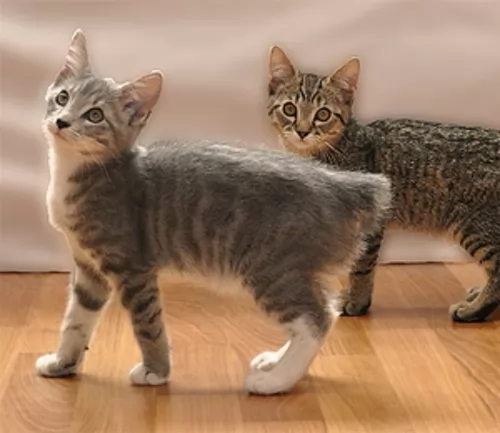 The absence of a tail with the Manx cat is believed to be a genetic defect and because of the spine that looks deformed, it is thought that this would cause the cat problems.
The absence of a tail with the Manx cat is believed to be a genetic defect and because of the spine that looks deformed, it is thought that this would cause the cat problems.
Arthritis can set in early with the Manx cat. Arthritis or osteoarthritis affects many cats and the signs of arthritis in a cat can actually be subtle. The disease can go undetected. Arthritis is about wear and tear in the joints, although other factors such as injury, infection and genetic makeup come into play as well. Arthritis can affect one or more joints in the body such as the hips, elbows ad spine.
The mutant gene that causes the taillessness in this cat may also be responsible for other skeletal deformities in the Manx cat. As a round-shaped cat, the Manx cat can also battle with bladder control.
These ailments are just possibilities with this cat breed and it is more than likely that your Manx cat will never have any one of these diseases.
To take care of the cat’s shiny coat, you can gently brush your Asian every week, not more, as they are short-haired cats, they’re not heavy shedders and they are low maintenance.
Age and general health will influence the way you feed your Asian cat. You’ll want to be feeding your feline friend the very best food there is as this will contribute towards his good health.
If you opt to feed your cat a commercially manufactured cat food, higher protein levels in wet foods might be better for your carnivorous pet. You don’t want to provide your cat with a high protein diet that is deficient in amino acids.
That is why it is important to research cat foods and their ingredients and get to know what are the most important ingredients for your cat to be getting. At all costs, avoid your cat becoming obese.
Make sure your cat has access to fresh cool water to maintain his body temperature.
Check your cat’s teeth, as he can’t convey to you that he is in pain – you need to check inside his mouth. Redness inside his ears might be indicative of an ear infection.
Whenever your cat seems to be ill, get him to the vet.
Provide your cat with a litter box that is kept hygienically clean.
Provide your cat with food- and water bowl, a brush for grooming and warm, dry sleeping basket.
Have your Asian neutered or spayed to prevent unwanted kittens.
Make sure your cat’s vaccines are up to date.
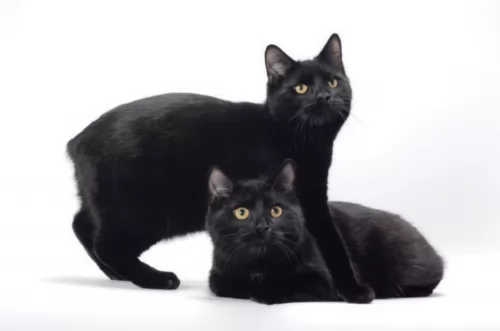 One of the most important caring things that you can do for your cat is to provide him with the best diet there is. The Manx cat requires a balanced diet of protein, vitamins and minerals.
One of the most important caring things that you can do for your cat is to provide him with the best diet there is. The Manx cat requires a balanced diet of protein, vitamins and minerals.
The Manx cat is a carnivore and will need a diet high in protein. Learn to read the labels on the packaging of the commercial cat food, whether wet or dry, and ensure that ingredients such as omega 3 fatty acids and taurine are in the ingredients list.
If you are in any doubt as to what to feed your Manx cat, speak to your vet.
The short coat of the Manx is easily cared for by a brush each week to remove dead, loose hair.
With this tailless cat, you need to check the rear end and perhaps clip the hair short in this area to ensure no feces clinging to the fur surrounding the anus.